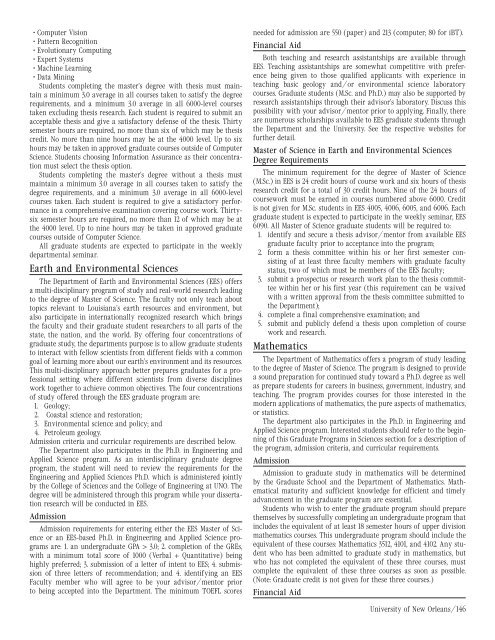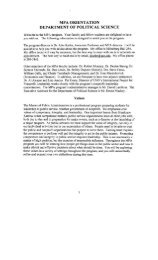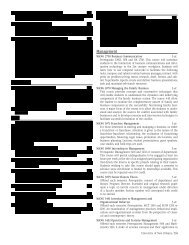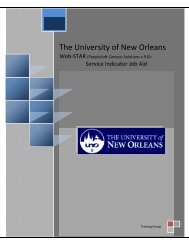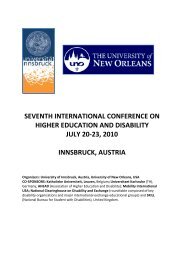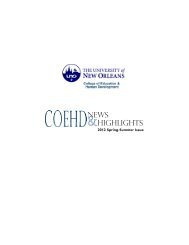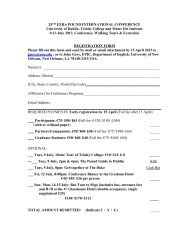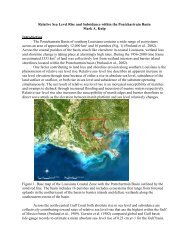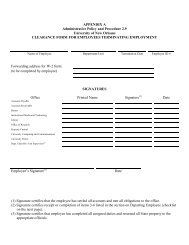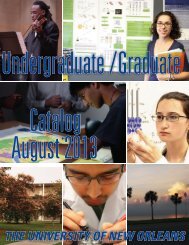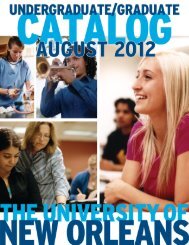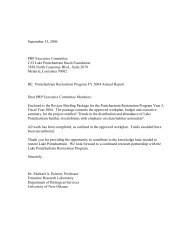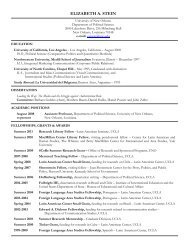Untitled - University of New Orleans
Untitled - University of New Orleans
Untitled - University of New Orleans
You also want an ePaper? Increase the reach of your titles
YUMPU automatically turns print PDFs into web optimized ePapers that Google loves.
• Computer Vision<br />
• Pattern Recognition<br />
• Evolutionary Computing<br />
• Expert Systems<br />
• Machine Learning<br />
• Data Mining<br />
Students completing the master’s degree with thesis must maintain<br />
a minimum 3.0 average in all courses taken to satisfy the degree<br />
requirements, and a minimum 3.0 average in all 6000-level courses<br />
taken excluding thesis research. Each student is required to submit an<br />
acceptable thesis and give a satisfactory defense <strong>of</strong> the thesis. Thirty<br />
semester hours are required, no more than six <strong>of</strong> which may be thesis<br />
credit. No more than nine hours may be at the 4000 level. Up to six<br />
hours may be taken in approved graduate courses outside <strong>of</strong> Computer<br />
Science. Students choosing Information Assurance as their concentration<br />
must select the thesis option.<br />
Students completing the master’s degree without a thesis must<br />
maintain a minimum 3.0 average in all courses taken to satisfy the<br />
degree requirements, and a minimum 3.0 average in all 6000-level<br />
courses taken. Each student is required to give a satisfactory performance<br />
in a comprehensive examination covering course work. Thirtysix<br />
semester hours are required, no more than 12 <strong>of</strong> which may be at<br />
the 4000 level. Up to nine hours may be taken in approved graduate<br />
courses outside <strong>of</strong> Computer Science.<br />
All graduate students are expected to participate in the weekly<br />
departmental seminar.<br />
Earth and Environmental Sciences<br />
The Department <strong>of</strong> Earth and Environmental Sciences (EES) <strong>of</strong>fers<br />
a multi-disciplinary program <strong>of</strong> study and real-world research leading<br />
to the degree <strong>of</strong> Master <strong>of</strong> Science. The faculty not only teach about<br />
topics relevant to Louisiana’s earth resources and environment, but<br />
also participate in internationally recognized research which brings<br />
the faculty and their graduate student researchers to all parts <strong>of</strong> the<br />
state, the nation, and the world. By <strong>of</strong>fering four concentrations <strong>of</strong><br />
graduate study, the departments purpose is to allow graduate students<br />
to interact with fellow scientists from different fields with a common<br />
goal <strong>of</strong> learning more about our earth’s environment and its resources.<br />
This multi-disciplinary approach better prepares graduates for a pr<strong>of</strong>essional<br />
setting where different scientists from diverse disciplines<br />
work together to achieve common objectives. The four concentrations<br />
<strong>of</strong> study <strong>of</strong>fered through the EES graduate program are:<br />
1. Geology;<br />
2. Coastal science and restoration;<br />
3. Environmental science and policy; and<br />
4. Petroleum geology.<br />
Admission criteria and curricular requirements are described below.<br />
The Department also participates in the Ph.D. in Engineering and<br />
Applied Science program. As an interdisciplinary graduate degree<br />
program, the student will need to review the requirements for the<br />
Engineering and Applied Sciences Ph.D. which is administered jointly<br />
by the College <strong>of</strong> Sciences and the College <strong>of</strong> Engineering at UNO. The<br />
degree will be administered through this program while your dissertation<br />
research will be conducted in EES.<br />
Admission<br />
Admission requirements for entering either the EES Master <strong>of</strong> Science<br />
or an EES-based Ph.D. in Engineering and Applied Science programs<br />
are: 1. an undergraduate GPA > 3.0; 2. completion <strong>of</strong> the GREs,<br />
with a minimum total score <strong>of</strong> 1000 (Verbal + Quantitative) being<br />
highly preferred; 3. submission <strong>of</strong> a letter <strong>of</strong> intent to EES; 4. submission<br />
<strong>of</strong> three letters <strong>of</strong> recommendation; and 4. identifying an EES<br />
Faculty member who will agree to be your advisor/mentor prior<br />
to being accepted into the Department. The minimum TOEFL scores<br />
needed for admission are 550 (paper) and 213 (computer; 80 for iBT).<br />
Financial Aid<br />
Both teaching and research assistantships are available through<br />
EES. Teaching assistantships are somewhat competitive with preference<br />
being given to those qualified applicants with experience in<br />
teaching basic geology and/or environmental science laboratory<br />
courses. Graduate students (M.Sc. and Ph.D.) may also be supported by<br />
research assistantships through their advisor’s laboratory. Discuss this<br />
possibility with your advisor/mentor prior to applying. Finally, there<br />
are numerous scholarships available to EES graduate students through<br />
the Department and the <strong>University</strong>. See the respective websites for<br />
further detail.<br />
Master <strong>of</strong> Science in Earth and Environmental Sciences<br />
Degree Requirements<br />
The minimum requirement for the degree <strong>of</strong> Master <strong>of</strong> Science<br />
(M.Sc.) in EES is 24 credit hours <strong>of</strong> course work and six hours <strong>of</strong> thesis<br />
research credit for a total <strong>of</strong> 30 credit hours. Nine <strong>of</strong> the 24 hours <strong>of</strong><br />
coursework must be earned in courses numbered above 6000. Credit<br />
is not given for M.Sc. students in EES 4005, 4006, 6005, and 6006. Each<br />
graduate student is expected to participate in the weekly seminar, EES<br />
6090. All Master <strong>of</strong> Science graduate students will be required to:<br />
1. identify and secure a thesis advisor/mentor from available EES<br />
graduate faculty prior to acceptance into the program;<br />
2. form a thesis committee within his or her first semester consisting<br />
<strong>of</strong> at least three faculty members with graduate faculty<br />
status, two <strong>of</strong> which must be members <strong>of</strong> the EES faculty;<br />
3. submit a prospectus or research work plan to the thesis committee<br />
within her or his first year (this requirement can be waived<br />
with a written approval from the thesis committee submitted to<br />
the Department);<br />
4. complete a final comprehensive examination; and<br />
5. submit and publicly defend a thesis upon completion <strong>of</strong> course<br />
work and research.<br />
Mathematics<br />
The Department <strong>of</strong> Mathematics <strong>of</strong>fers a program <strong>of</strong> study leading<br />
to the degree <strong>of</strong> Master <strong>of</strong> Science. The program is designed to provide<br />
a sound preparation for continued study toward a Ph.D. degree as well<br />
as prepare students for careers in business, government, industry, and<br />
teaching. The program provides courses for those interested in the<br />
modern applications <strong>of</strong> mathematics, the pure aspects <strong>of</strong> mathematics,<br />
or statistics.<br />
The department also participates in the Ph.D. in Engineering and<br />
Applied Science program. Interested students should refer to the beginning<br />
<strong>of</strong> this Graduate Programs in Sciences section for a description <strong>of</strong><br />
the program, admission criteria, and curricular requirements.<br />
Admission<br />
Admission to graduate study in mathematics will be determined<br />
by the Graduate School and the Department <strong>of</strong> Mathematics. Mathematical<br />
maturity and sufficient knowledge for efficient and timely<br />
advancement in the graduate program are essential.<br />
Students who wish to enter the graduate program should prepare<br />
themselves by successfully completing an undergraduate program that<br />
includes the equivalent <strong>of</strong> at least 18 semester hours <strong>of</strong> upper division<br />
mathematics courses. This undergraduate program should include the<br />
equivalent <strong>of</strong> these courses: Mathematics 3512, 4101, and 4102. Any student<br />
who has been admitted to graduate study in mathematics, but<br />
who has not completed the equivalent <strong>of</strong> these three courses, must<br />
complete the equivalent <strong>of</strong> these three courses as soon as possible.<br />
(Note: Graduate credit is not given for these three courses.)<br />
Financial Aid<br />
<strong>University</strong> <strong>of</strong> <strong>New</strong> <strong>Orleans</strong>/146


